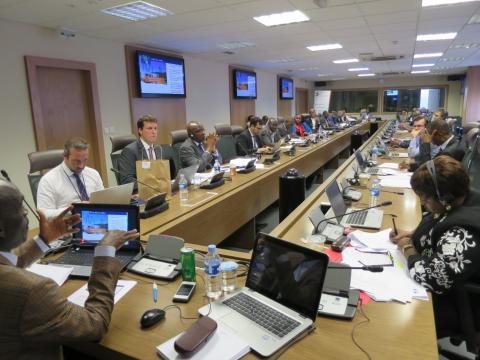
Enhancing learning from evaluations to help improve current and future policies, strategies, projects, and processes at the African Development Bank (AfDB) is one of the Independent Development Evaluation (IDEV) three main objectives.
By conducting independent evaluations and proactively sharing best practice, IDEV ensures that the Bank and its stakeholders learn from past experiences, and plan and deliver new development activities to the highest possible standards. To that end, IDEV has revamped its project cluster evaluations, which examine in-depth a group of projects in the same sector or along the same theme, to focus on learning rather than accountability. The new project cluster evaluations focus on findings and lessons, without providing recommendations to Bank Management.
On Thursday 1 February 2018, IDEV and the Power, Energy, Climate Change and Green Growth complex at the AfDB held a knowledge workshop to discuss the results of two IDEV project cluster evaluations, of AfDB-funded rural electrification and power interconnection projects.
The workshop allowed IDEV and the Power and Energy complex to discuss the main outcomes of the project cluster evaluations and to draw lessons learned (what worked, what did not work and why) to guide future activities of the Bank in this sector. The workshop was also intended to seek feedback from the energy complex on the usefulness of this new type of evaluation and to get a sense of how the findings and lessons learned from the evaluations will be used by the complex moving forward.
The day long workshop was attended by over 30 staff from IDEV and PEVP, including from various field offices connecting through video conference. Following initial presentations of the findings and lessons of the evaluations, participants engaged in an open exchange.
In the morning session, Sharing Rural Electrification Evaluation Results, the workshop participants discussed a number of findings, including the importance of a holistic approach to the transformation of African rural areas and the need for strong political support and proper institutional frameworks. Moreover, the evaluation highlighted the importance of good quality project design from the start in ensuring timely project implementation, appropriate technical solutions and good monitoring and evaluation systems of the projects.
The afternoon session saw a lively discussion on the results of the Power Interconnection Cluster Evaluation, which highlighted key contributing factors to the success (or lack thereof) of such projects, including sustained strong political commitment; strong regional institutional frameworks to support the projects; quality of project design; and the adequacy of Power Purchase Agreements.
Participants generally subscribed to the relevance of the findings and lessons, and shared their views, knowledge and experience. The rich discussions also enabled the identification of several solutions that could help strengthen new Bank operations in the areas of rural electrification and power interconnection, such as clear definition of access to electricity, and how to increase electricity consumption in rural areas.
The two project clusters evaluations are expected to be presented to the AfDB Board of Directors in early March, and will be published shortly thereafter. Furthermore, A similar capitalization workshop will be organized later this month on the IDEV cluster evaluation of the Bank’s agricultural value chain projects.

